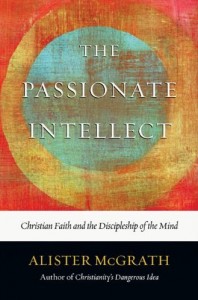
A couple of months ago, InterVarsity Press sent me a review copy of Alister McGrath’s new book, The Passionate Intellect: Christian Faith and the Discipleship of the Mind. I had been looking forward to reading it, but didn’t have a chance until last week, when a flu-like illness left me too tired to do much other than read.
First, a note on the format of the book: The Passionate Intellect is a collection of thematically-connected essays, based on various lectures and talks given by McGrath over the past couple of years. McGrath has divided them into two sections. The first, “The Purpose, Place and Relevance of Christian Theology,” includes essays on George Herbert, Martin Luther, and C. S. Lewis, as well as reflections on natural theology and apologetics. The second, “Engaging with Our Culture,” focuses more narrowly on two related contemporary debates —the conflicts (perceived or real) between science and religion, and the rise of “New Atheism” (Dawkins, Hitchens, et al.).
Perhaps it was the progress of my illness, but I found the second section much more engaging and interesting than the first. Then again, it might have been McGrath’s own engagement with science and atheism. The second section opens with an essay called “The Natural Sciences: Friends or Foes of Faith?,” in which McGrath briefly recounts his own journey from an atheist undergraduate majoring in molecular biology (McGrath has a PhD in that discipline) to a Christian theologian and apologist. As I am, McGrath is fascinated by “those things that are either too big or too odd for science to explain.”
For example, I came to appreciate that the explicability of nature was itself astonishing and required an explanation in its own right. I was not alone here. Albert Einstein pointed out back in 1936 that “the eternal mystery of the world is its comprehensibility.” The intelligibility of the natural world, demonstrated by the natural sciences, raises the question as to why there is such a fundamental resonance between human minds and the structures o the universe. Why would be we be able to make sense of the world at such a deep level? It seems to confer no obvious evolutionary advantage! But it is surely one of the most exciting things about the Christian faith that it creates intellectual space for the natural sciences by articulating a vision of an ordered reality that is open to study by a human mind shaped in the “image of God.” (108, emphasis original)
Anyone interested in the evolution/Creationism/ID debate should read McGrath’s ninth essay in this book, “Augustine of Hippo on Creation and Evolution.” Though brief (only 7 pages), McGrath helpfully lays out Augustine’s own approach to the Bible’s descriptions of Creation, which intentionally avoids tying Biblical interpretation to specific scientific models.
Augustine argues that the first creation account (Genesis 1:1-2:3) cannot be interpreted in isolation but must be set alongside the second creation account (Genesis 2:4-25), as well as every other statement about the creation found in Scripture. For example, Augustine suggests that Psalm 33:6-9 speaks of an instantaneous creation of the world through God’s creative Word, while John 5:17 points to a God who is still active within creation. God created the world in an instant but continues to develop and mold it, even to the present day. This leads Augustine to suggest that the six days of creation are not to be understood chronologically. Rather, they are a way of categorizing God’s work of creation. They provide a framework for the classification of the elements of the created world so they may be better understood and appreciated. (140-141)
Overall, I enjoyed the book and found it to be an accessible introduction to McGrath (who I had not read before). I suspect that, because of the format and origin, those who are already familiar with McGrath’s work will not find much new ground here. I especially appreciated McGrath’s approach to science and responses to the New Atheist movement.
Have you read this or other books by Alister McGrath? What do you think?
The former Associate Director for the Emerging Scholars Network, Micheal lives in Cincinnati with his wife and three children and works as a web manager for a national storage and organization company. He writes about work, vocation, and finding meaning in what you do at No Small Actors.

Leave a Reply